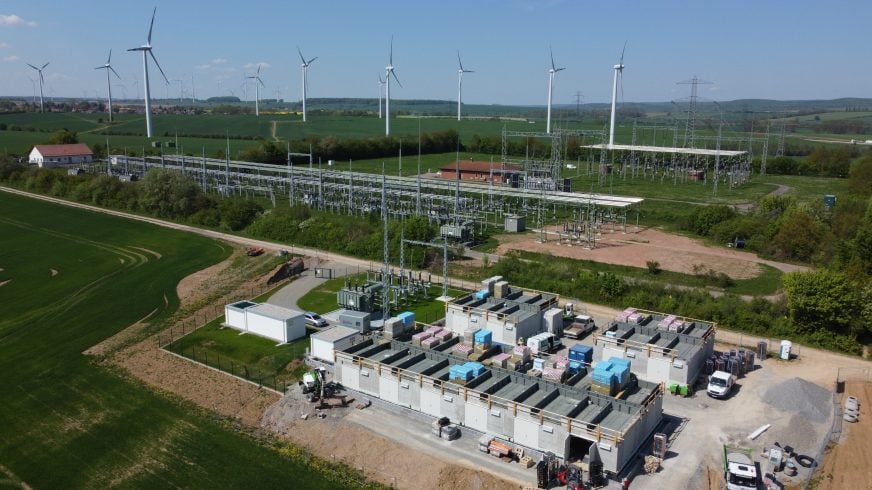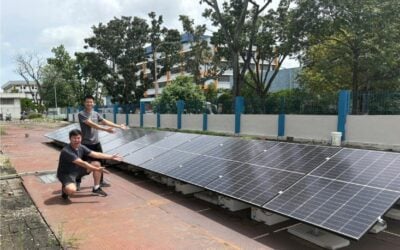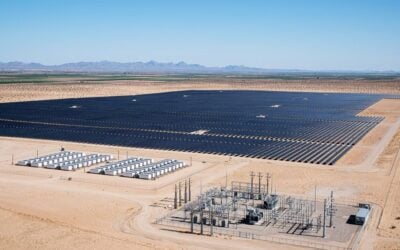
The European Union’s Green Deal Industrial Plan has been welcomed by the European Association for Storage of Energy (EASE), although more detailed pledges of support for energy storage included in a leaked draft seen by the industry group were absent from the final publication.
The Green Deal Industrial Plan, to boost the bloc’s industrial competitiveness and support its path to carbon neutrality, was unveiled yesterday by the European Commission (EC), following commission president Ursula von der Leyen’s announcement of it at January’s World Economic Forum.
Enjoy 12 months of exclusive analysis
- Regular insight and analysis of the industry’s biggest developments
- In-depth interviews with the industry’s leading figures
- Annual digital subscription to the PV Tech Power journal
- Discounts on Solar Media’s portfolio of events, in-person and virtual
Batteries and energy storage were highlighted by the president among other key technologies such as solar, wind and green hydrogen for their importance to the European Union (EU) energy transition.
Patrick Clerens, secretary general of the industry group European Association for Storage of Energy (EASE), said following von der Leyen’s initial announcement that it was the first time energy storage had been “so clearly considered by the European Union as a crucial sector”.
“Cleantech investors are looking at European Union and trying to understand if politicians are going to walk the walk and have a clear vision for energy storage. We don’t know that yet, but this is promising,” Clerens told Energy-Storage.news in late January.
As reported by Energy-Storage.news at the time of von der Leyen’s speech, part of the motivation behind it is to reduce a competitive gap with the US, which has implemented significant tax breaks and other support for green energy manufacturing and deployment with its Inflation Reduction Act (IRA) legislation.
It should also help facilitate an accelerated push towards higher shares of renewable energy in the EU, particularly in light of REPowerEU, the strategy to reduce dependence on Russian imported fossil fuels.
However, while a document leaked shortly before the plan’s official launch yesterday included pledges of support for energy storage technologies, the final version only directly mentions energy storage in the context of its eligibility to benefit from the EU’s €40 billion (US$44.05 billion) Innovation Fund.
Yet EASE said in response to the final document it was nonetheless “encouraged” by the Green Deal Industrial Plan, and despite “regret” that numerous mentions of energy storage in the leaked draft hadn’t made it through to the final version, the group remained optimistic.
For instance, many of the provisions of the plan at this stage appear to be technology agnostic and could apply to energy storage, such as the first of its four main pillars: a Net-Zero Industry Act to create simpler regulatory frameworks that could speed up permitting and cut other red tape around renewable energy projects. Reducing lead times for clean energy projects is also a stated aim of REPowerEU, while there will also be a Critical Raw Materials Act to support development of supply chains for things like rare earths, or minerals used in battery production.
Similarly, the second pillar is to accelerate investment and funding into renewable energy manufacturing in Europe, including revision of state aid rules which regulate individual Member States’ levels of support allowed for domestic industry while protecting a level, competitive playing field within the EU.
The final two pillars are to enhance skills among the labour force required – von der Leyen had said the EU expects around a third of jobs in the bloc could be impacted by the clean energy economy – and to open up trade to support the energy transition’s vital supply chains.
‘Lack of recognition hindering necessary investments’
Clearly, energy storage could be a part of the game in each of those areas. EASE said it was confident that EC assessments will recognise its importance “as a core strategic industry to reach climate neutrality”.
“The European Union should give fair recognition to the critical role that energy storage plays in the energy system and the need to unlock energy storage’s industrial potential,” EASE said in a statement sent yesterday to media including Energy-Storage.news.
“Europe’s energy storage sector is a global leader in clean tech, but oftentimes, its role is not fully recognised by policymakers. This hinders necessary investments, as resources are deployed where there is clear political commitment to energy storage.”
EASE called the Green Deal Industrial Plan the perfect opportunity to adjust that course, and strongly backed the strategic focus on the pillars, noting that a simplified regulatory environment, better access to financing and skilling up the workforce are all things that can benefit energy storage.
However, the trade group continued to advocate for the European Union to implement targets for energy storage the way it has done for other technologies like renewable energy generation. According to modelling done by EASE, the EU will need around 200GW of energy storage by 2030, equivalent to 14GW of new deployments annually, to meet its decarbonisation and renewables targets.
In a brief research note, analysts Evercore ISI said the most important takeaway from the Green Deal Industrial Plan is the “additional boost in spending and reduction in red tape in the EU to accelerate the expansion of renewable energy and sustainable technologies on the continent”.
“The EU will set goals to expand specific technologies by 2030, identify strategically important clean tech projects, and likely set more EU standards for net zero emissions products,” Evercore ISI wrote, noting that together with loosening of state aid rules, EU Member States will be able to access a pool of €225 billion of loans and €20 billion of grants, the former from existing EU funds, the latter from money left over in the EU’s post-pandemic recovery fund.
Read coverage of the EU Green Deal Industrial Plan as it pertains to the solar PV industry from our colleagues at PV Tech.
Energy-Storage.news’ publisher Solar Media will host the 8th annual Energy Storage Summit EU in London, 22-23 February 2023. This year it is moving to a larger venue, bringing together Europe’s leading investors, policymakers, developers, utilities, energy buyers and service providers all in one place. Visit the official site for more info.






